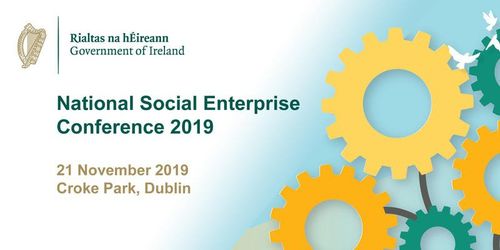On Thursday November 21st, 2019 the Department of Rural and Community Development hosted the first annual National Social Enterprise Conference. The new “National Social Enterprise Policy for Ireland 2019-2022”, published in July 2019, was presented and attendees had an opportunity to explore one of its three themes, which are:
- Building Awareness of Social Enterprise;
- Growing and Strengthening Social Enterprise, the conference discussed improving business and leadership supports;
- Achieving Better Policy Alignment, the conference discussed funding and finance supports.
There were presentations throughout the morning from people engaging in social entrepreneurship and a panel discussion on “social enterprise within the broader entrepreneurship ecosystem”.
There were three parallel sessions after lunch covering:
- Growing Social Enterprise at the Local Level.
- Supply Chain, Procurement and Market Opportunities for Social Enterprise.
- Social Enterprise and Community & Voluntary: Complementarity of Purpose.
The Irish National Organisation of the Unemployed (INOU) participated in the third parallel session. It is welcome that the new social enterprise policy acknowledges that "Many social enterprises have emerged from the community and voluntary sector and build on the work of that sector in addressing social challenges." (p9)
In the new policy social enterprise is defined as:
- An enterprise whose objective is to achieve a social, societal or environmental impact, rather than maximising profit for its owners or shareholders, which
- Pursues its objectives by trading on an ongoing basis through the provision of goods and/or services, and by reinvesting surpluses into achieving social objectives, and is
- Governed in a fully accountable and transparent manner and is independent of the public sector. If dissolved, it should transfer its assets to another organisation with a similar mission.
Given the work of community based organisations it is particularly welcomed that amongst the “spectrum of social enterprise activity in Ireland” in the new policy are:
- “‘Deficient Demand’ social enterprises which seek to meet a demand for goods and services within a community where there is insufficient demand for the operation of a regular market due to inherent economic and social disadvantage or low density of population,”
- "Work Integration Social Enterprises (WISEs), which support disadvantaged people to prepare for, and participate in, the labour market,"
- "Social enterprises contracted with the public sector to deliver public services in disadvantaged areas and communities," (p10)
The reality is that in many communities addressing challenges of marginalisation, disadvantage and / or isolation, sufficient income to generate a surplus is not feasible as the people using these services cannot afford the market rate. If they could the private-for-profit sector would already be meeting their needs.
The INOU calls for the long awaited social enterprise policy not to lose sight of the important work undertaken by locally based ‘deficit demand social economy enterprises’. The roll-out of the policy should not exclude more vulnerable providers, often operating on limited resources and seeking to address market and societal failures within their communities.
“Financial supports for social enterprises in Ireland are often provided through labour market activation programmes which provide work placements or training in social enterprises to help unemployed people to improve their employment options. In other cases, grants are provided to social enterprises, for example through the Community Services Programme (CSP), towards the cost of employing staff to enable them to deliver local services. CSP is particularly important for social enterprises operating in the community and voluntary tradition.” (NSEPI, p19)
The Employment, Development and Information (EDI) Centre from Longford also participated on this panel and elaborated on the challenges facing organisations seeking to address local social and economic issues through programmes like the CSP. Amongst the EDIC’s work is the delivery of a furniture recycling service, Revamp, which is an innovative furniture recycling and reuse initiative established initially in 2002 as a training project for long-term unemployed young people. In 2003, the project expanded and now strives to promote the re-use of unwanted high quality low cost household furniture to people living in Co. Longford and the surrounding environs. The project combines environmental, social and economic factors, by recycling unwanted household furniture for the disadvantaged with training and the provision of employment opportunities for long-term unemployed young people.
